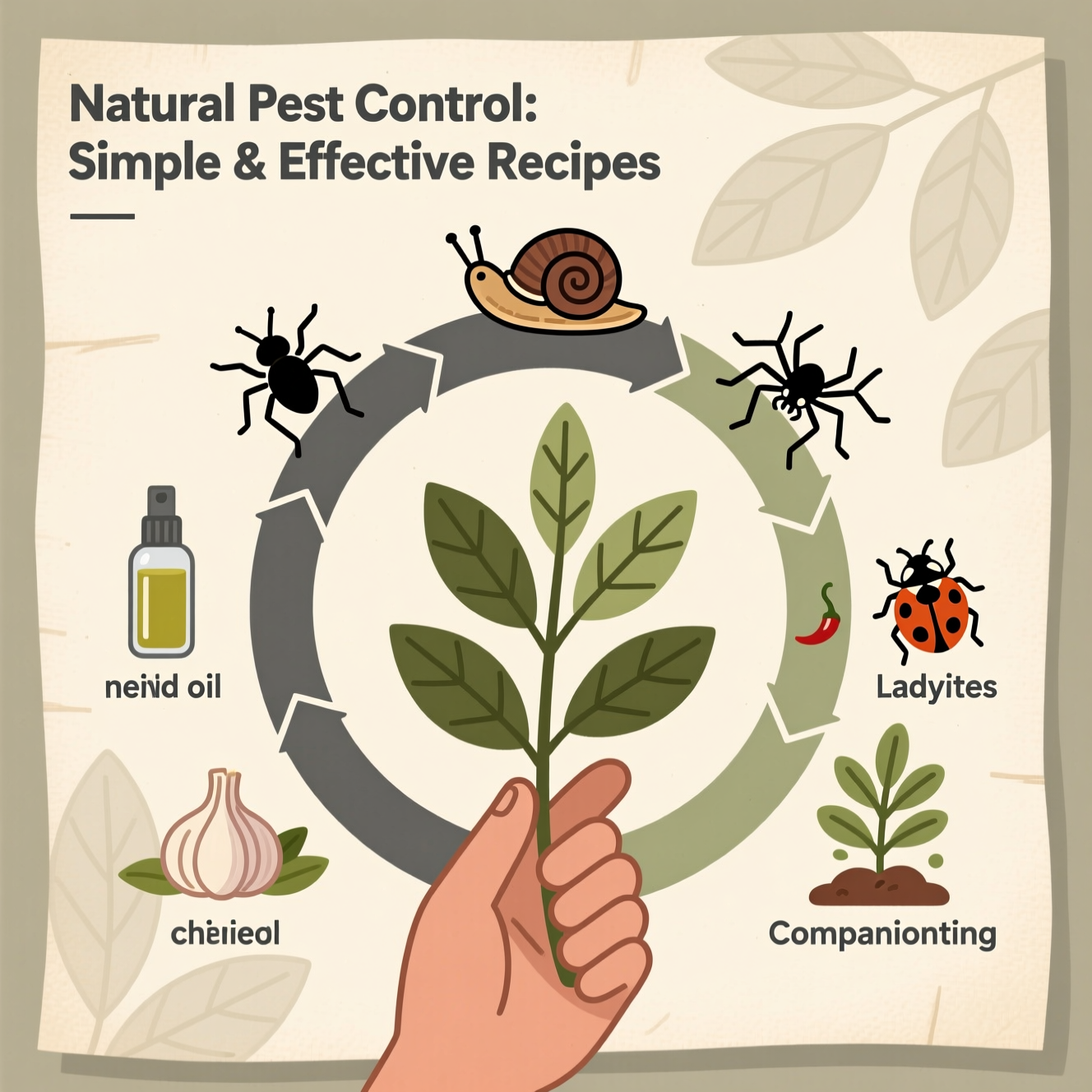What is a Natural Garden Pest Control Recipe?
Natural garden pest control recipes offer eco-friendly solutions for managing unwanted garden pests. These formulations often utilize horticultural oils, botanical insecticides, or other organic matter. Their primary goal is to disrupt pest life cycles and deter infestations without synthetic chemicals. Modern experts emphasize their role in promoting biodiversity and supporting beneficial insects.
These homemade insect spray recipes work through various mechanisms. For instance, insecticidal soaps can disrupt an insect’s exoskeleton, while certain plant-derived compounds impact their nervous systems or respiration. The global organic pesticides market is projected to show significant growth, indicating a strong consumer shift towards sustainable gardening practices. Such recipes are a cornerstone of organic gardening.
How to Make a Natural Insecticide with Dish Soap, Vinegar, and Water?
Crafting a natural insecticide is straightforward for garden pest control. A simple DIY garden spray uses common household items. This vinegar pest spray offers an effective solution for many garden issues. The recipe helps emulsify ingredients for consistent application. For most gardeners, this method provides a rapid response to infestations.
Mild liquid soaps, when diluted, are effective against soft-bodied insects like aphids by disrupting cell membranes. The soap acts as a surfactant, breaking down the protective outer layer of insects. White vinegar or apple cider vinegar can help deter some pests. A common, effective ratio is 1 tablespoon of mild liquid dish soap and 1 tablespoon of vinegar per quart of water. This mixture is best applied using a spray bottle directly onto pests. Ensure thorough coverage for optimal results with your dish soap insecticidal spray.
When applying, aim for early morning or late evening to avoid potential leaf scorch. Test the natural insecticide recipe on a small area first. Observe for any adverse reactions before treating the entire plant. Vinegar’s acidity can alter soil pH slightly, so avoid over-application. In summary, this easy-to-make concoction is a valuable tool for sustainable pest management.
Does the Smell of Vinegar Keep Bugs Away?
Vinegar’s effectiveness as a bug repellent is often debated. Its distinct scent, derived from acetic acid, can indeed act as an olfactory deterrent for certain pests. This makes it a popular choice for those seeking natural bug repellent solutions.
For most gardeners, understanding this mechanism is key. Studies suggest specific volatile organic compounds in vinegar can disrupt insect navigation and feeding behaviors, particularly for pests like fruit flies and ants. In practical terms, while it may deter some garden smells, its broad efficacy is limited.
The technical application of vinegar as a pest deterrent requires careful consideration. Its acetic acid concentration can be too harsh for some plants, causing damage. Furthermore, the impact varies significantly by insect species. For most gardeners, it is not a foolproof solution for all bugs.
What is the Right Mix of Apple Cider Vinegar and Water for a Fruit Fly Trap?
Creating an effective fruit fly trap for kitchen pests is straightforward. A popular homemade fruit fly control method utilizes a simple mixture to lure these nuisance insects. The key is to present a bait with a strong, sweet aroma that naturally attracts them. For most gardeners and homeowners, this approach offers a practical solution.
A commonly recommended fruit fly trap recipe involves a 1:1 ratio of apple cider vinegar to water. To enhance its efficacy and ensure fruit flies cannot easily escape, add a single drop of dish soap. This addition breaks the surface tension of the liquid, causing them to sink and drown. Recent studies show fruit flies can lay up to 500 eggs in their short lifespan, making prompt trapping crucial for population control and preventing rapid infestations.
What is the Best Way to Control Garden Pests Naturally Without Harming Produce?
Effective natural vegetable pest control prioritizes chemical-free produce through sustainable gardening. Integrated Pest Management (IPM) emphasizes using the least toxic methods first. This includes encouraging beneficial insects like ladybugs and lacewings, utilizing physical barriers, and implementing proper sanitation. ‘90% of plant-feeding insects have natural enemies,’ highlighting the power of biological control.
For most gardeners, a holistic approach enhances safe garden pesticides. Companion planting strategically deters pests. Hand-picking larger insects offers immediate control. Crop rotation disrupts pest life cycles, preventing buildup. Encouraging natural predators can reduce the need for interventions by up to 60%.
How Do You Get Rid of Slugs and Snails Naturally?
Natural slug and snail control offers humane garden protection. Effective methods target their vulnerabilities. For instance, The Royal Horticultural Society highlights several organic approaches. These strategies work by repelling or physically incapacitating the pests.
Diatomaceous earth (DE) provides excellent garden slug repellent. It works by abrading their slimy outer layer, causing dehydration. Copper tape creates a mild electrical charge, deterring snails. Beer traps exploit their attraction to fermentation, drowning them. A single beer trap can capture dozens of slugs in a night. These methods offer effective snail deterrents and natural slug control.
Hand-picking remains a direct, organic snail control tactic. Regular patrols at dawn or dusk can significantly reduce populations. In practical terms, combining these techniques ensures robust garden slug repellent strategies. These integrated pest management techniques protect plants effectively.
What Makes Dawn Dish Soap Effective for Killing Bugs?
Dawn dish soap possesses potent insecticidal properties due to its formulation as a surfactant. This action is crucial for gardeners seeking a natural insecticide ingredient. Its ability to disrupt insect physiology makes it an effective solution for controlling common garden pests.
The key components in many dish soaps are surfactants like sodium lauryl sulfate. These molecules act as emulsifiers, breaking down the waxy cuticle of an insect’s exoskeleton. This compromised outer layer leads to rapid desiccation, causing the insect to die from dehydration. The soap’s effectiveness lies in its ability to strip away vital lipids from the insect exoskeleton, a critical barrier.
In practical terms, dish soap, particularly varieties with strong degreasing capabilities like Dawn, disrupts the insect’s cell membrane. This interference is a direct attack on the insect’s physiological integrity. For most gardeners, this method offers a readily available and generally safe way to manage insect populations without resorting to harsher chemicals.

Tyler manages the physical testing of LEDs, pumps, and sensors. With a background in mechanical systems, he is the architect behind our ROI and Yield calculators, transforming complex hardware specs into actionable data for our readers.

